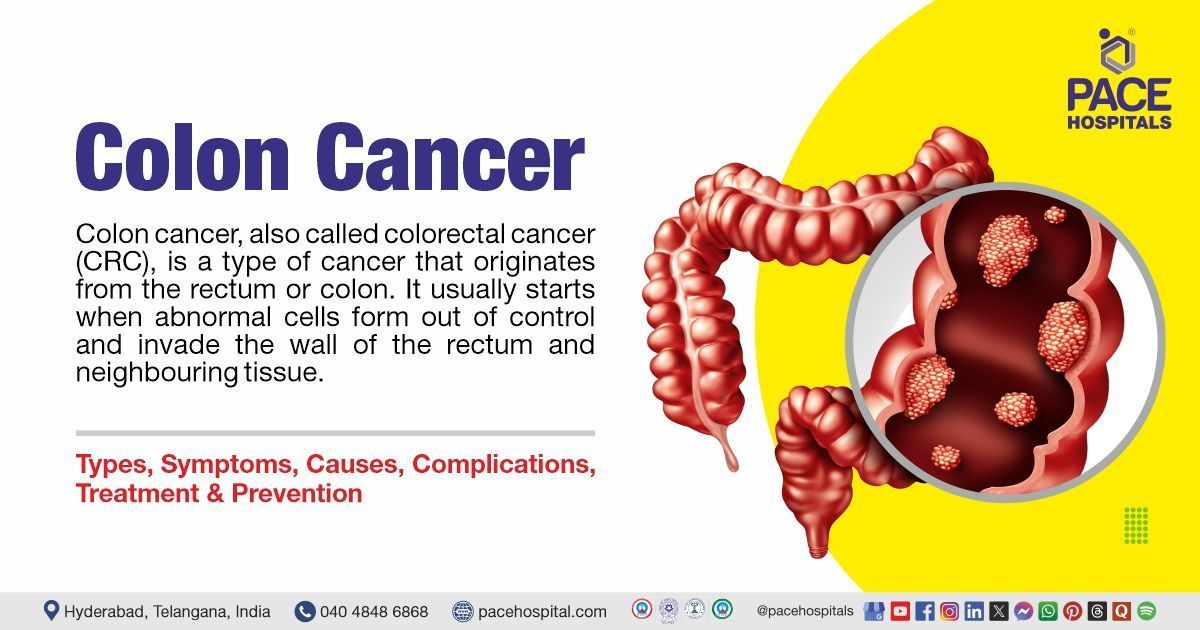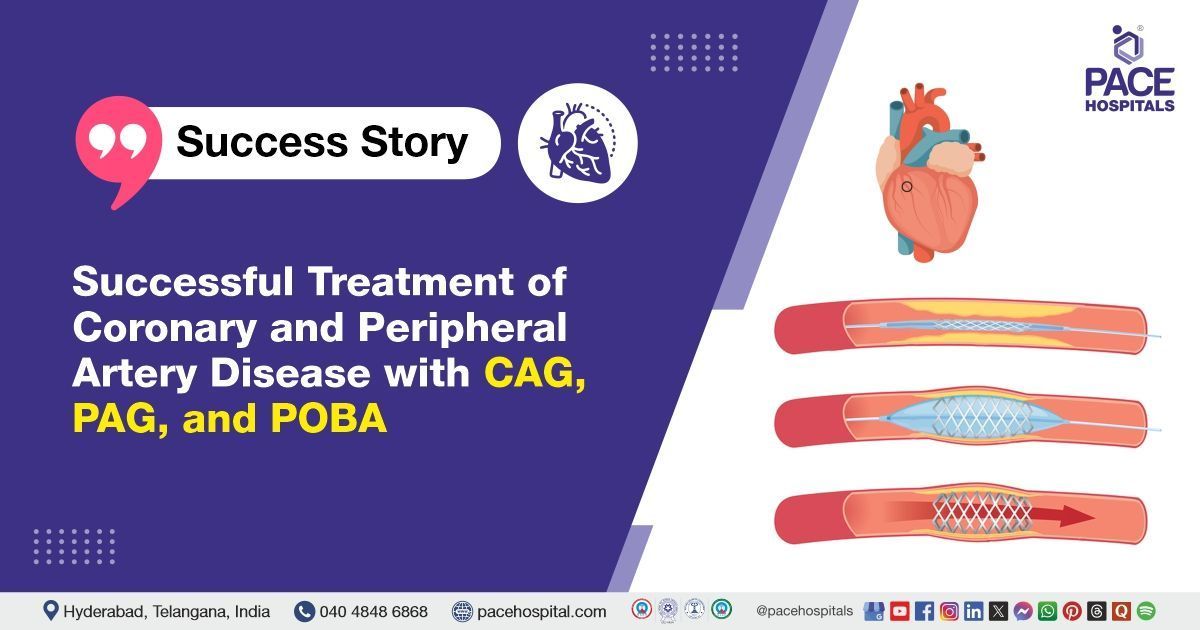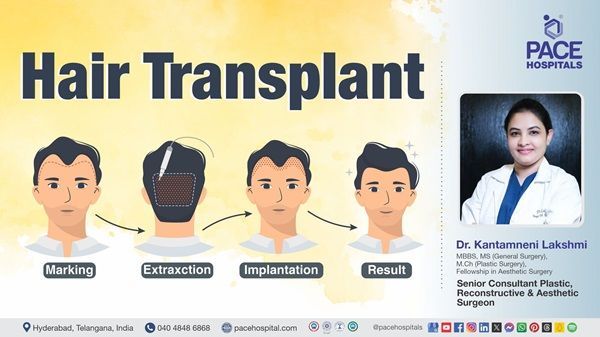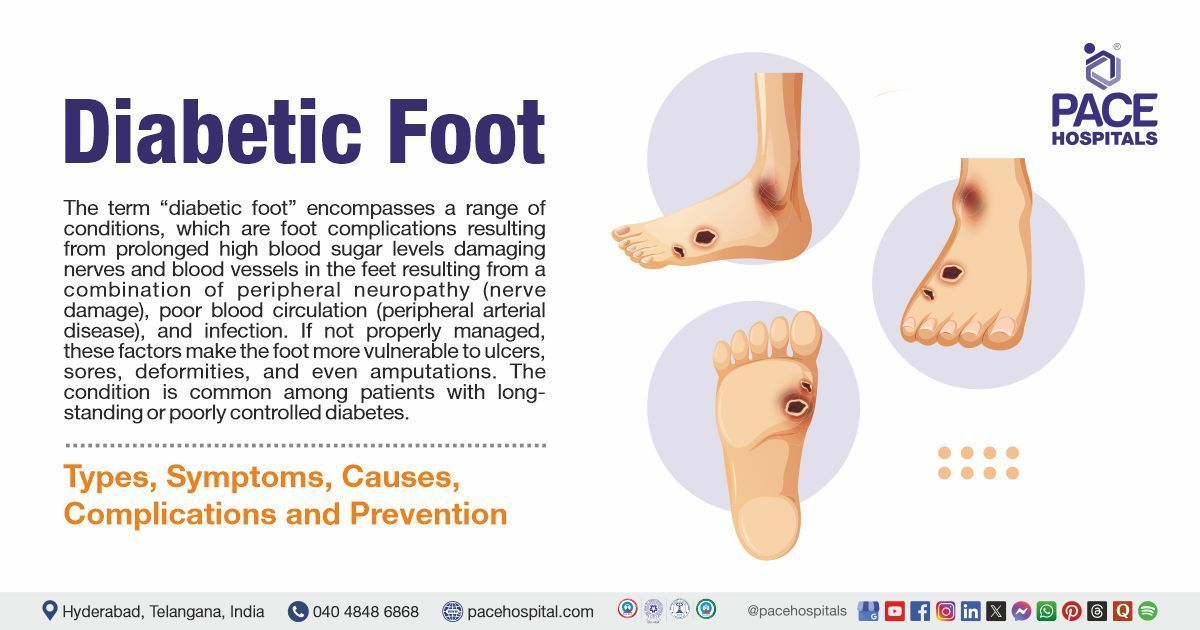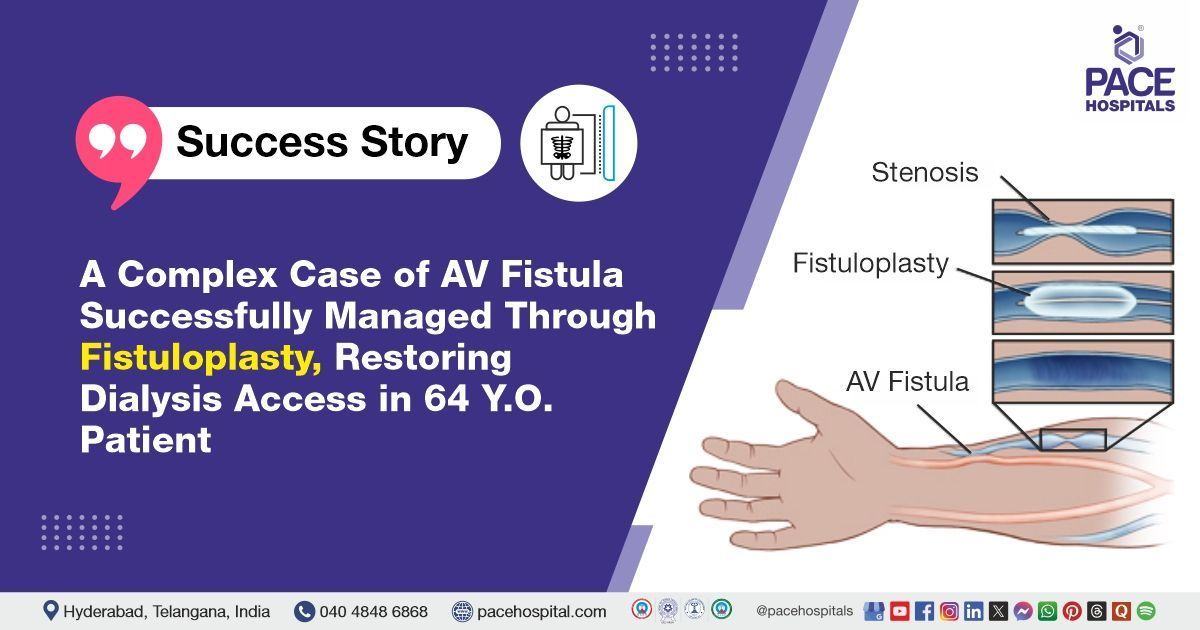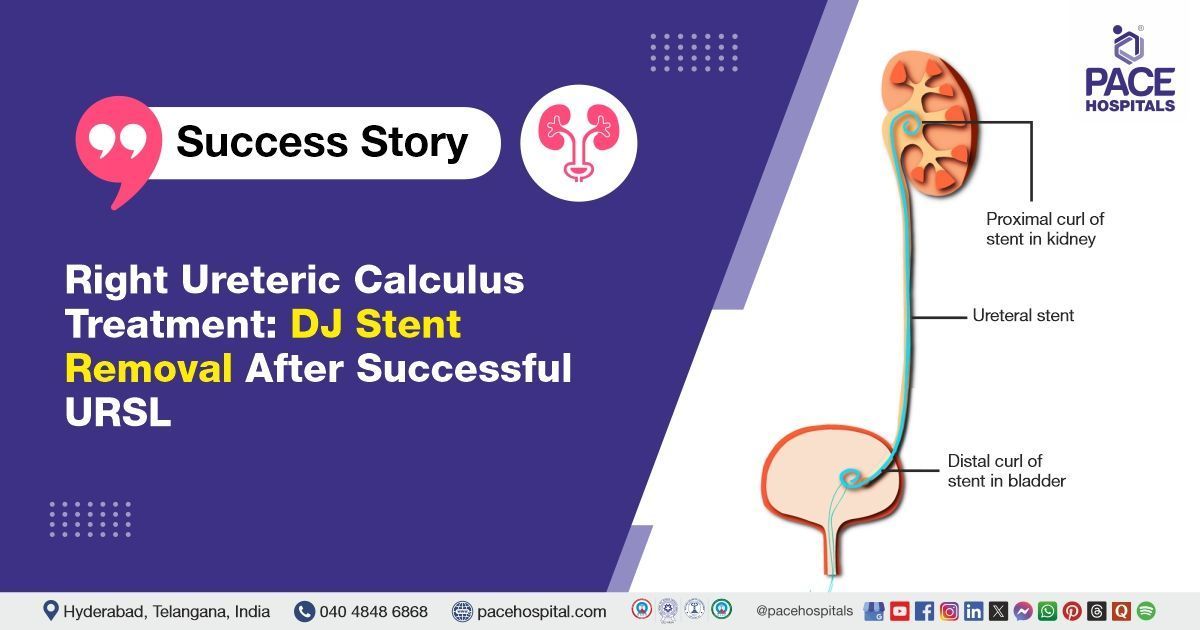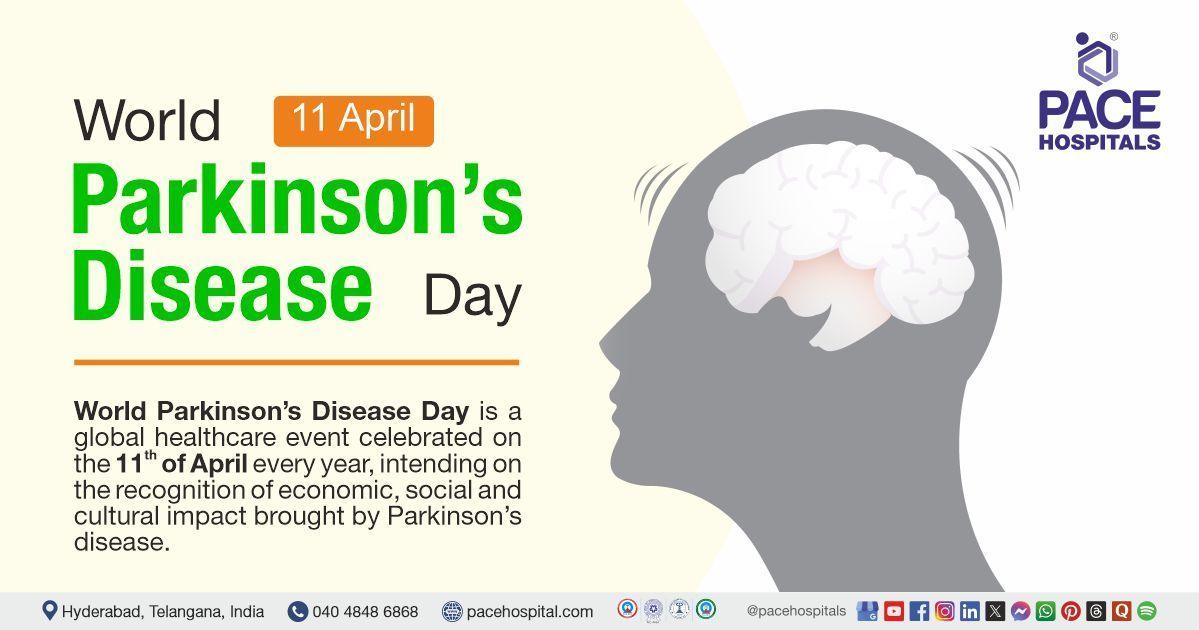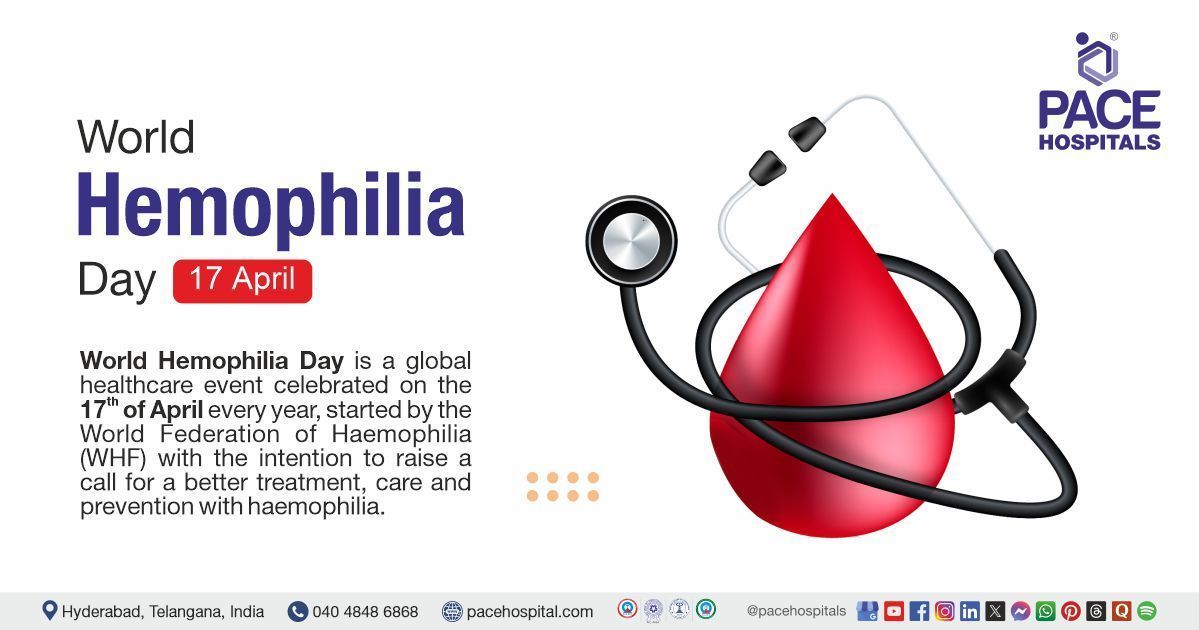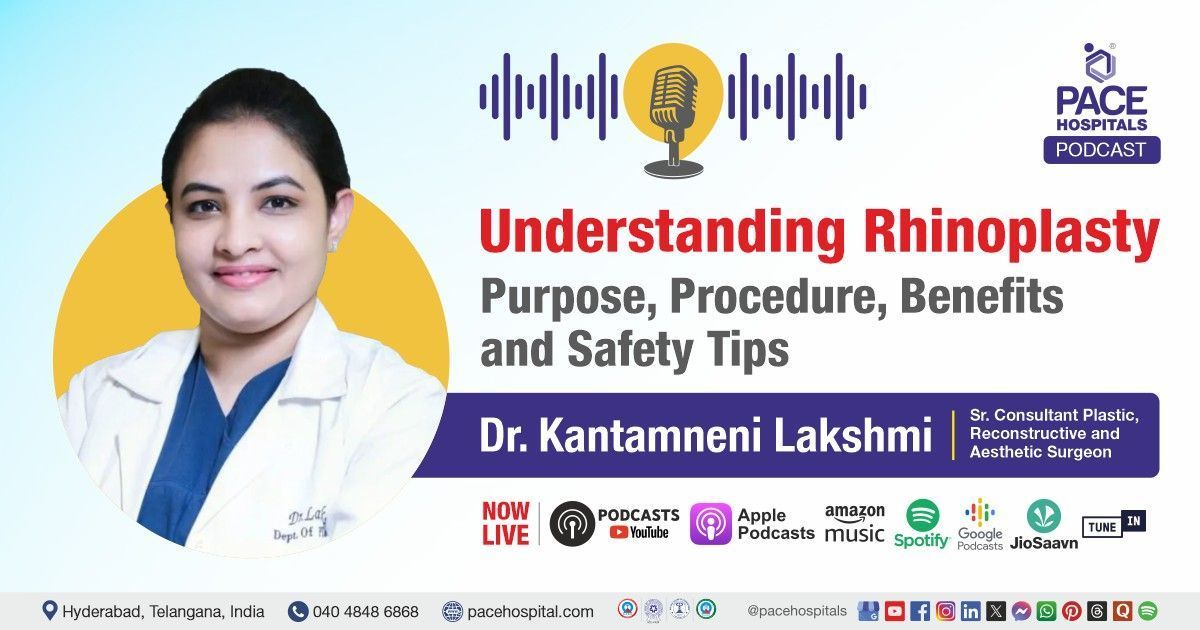Colon Cancer: Types, Causes, Risk factors, Symptoms, Treatment & Prevention
Colon cancer definition
Colon Cancer, also called colorectal cancer (CRC), is a type of cancer that originates from the rectum or colon. It usually starts when abnormal cells grow out of control and invade the wall of the rectum and neighbouring tissue. The colon is part of the body's digestive system and the first and longest part of the large intestine.
Colon cancer primarily affects the large intestine, which is where waste materials from digestion accumulate. The colon is responsible for absorbing vitamins and nutrients from digested food and converting the remaining waste products into stool (poop). The rectum stores stool and is the lower part of the large intestine.
Colon cancer meaning
The term "colon" is derived from the Greek word “kolon”, which refers to the large intestine. The word "cancer" is derived from the Greek word “karkinos”, meaning crab, which refers to the shape of the tumors and their ability to spread to other body parts, similar to the way a crab's legs extend.
Colon cancer prevalence
According to the World Health Organization (WHO), colon cancer is the 2nd leading cause of cancer deaths worldwide, representing about 10% of all cancer cases. Globally, it is the 3rd most common cancer, with over 0.19 crore new cases and more than 930,000 deaths estimated in 2020.
Colon cancer incidence varies by region and age group. The incidence of colon cancer (CRC) in India is lower as compared to developed countries. However, the incidence has been increasing in recent years.
Currently, colon cancer is the 7th most common cancer in India, and the number of cases is rising, with a 20% increase from 2004 to 2014, with 65,358 new cases in 2021. It primarily affects older individuals, predominantly those aged 50 and above.

Types of colon cancer
Colorectal cancer can be classified into several types depending on the location, cell type and growth patterns. The different types of colon cancer include:
Adenocarcinoma
It is the most common type of colon cancer, accounting for about 95% of all cases. It originates from the glandular cells that line the inside of the colon and rectum. Typically, it starts as a tissue growth called a polyp. Specifically, adenomas may develop into cancer.
Adenocarcinomas are classified into two less common subtypes:
- Mucinous adenocarcinoma: This tumor consists of approximately 60 percent mucus. The presence of mucus may lead to quicker and more aggressive cancer cell spread compared to typical adenocarcinomas. Mucinous adenocarcinomas represent about 10 to 15 percent of all rectal and colon adenocarcinomas.
- Signet ring cell adenocarcinoma: Signet ring cell adenocarcinoma represents less than 1 percent of all colon cancers. Its name derives from its distinctive appearance under a microscope and is often aggressive, making treatment more challenging.
Carcinoid Tumours
These are rare, slow-growing tumors that begin in the hormone-producing cells of the colon. They are typically less aggressive than adenocarcinomas.
Gastrointestinal Stromal Tumours (GISTs)
These are the rare types of colon cancer tumors that develop in the connective tissue of the digestive tract, including the colon. They are typically treated differently from other forms of colon cancer.
Lymphoma
Though rare, lymphoma can also affect the colon and rectum, primarily arising from lymphatic tissue.
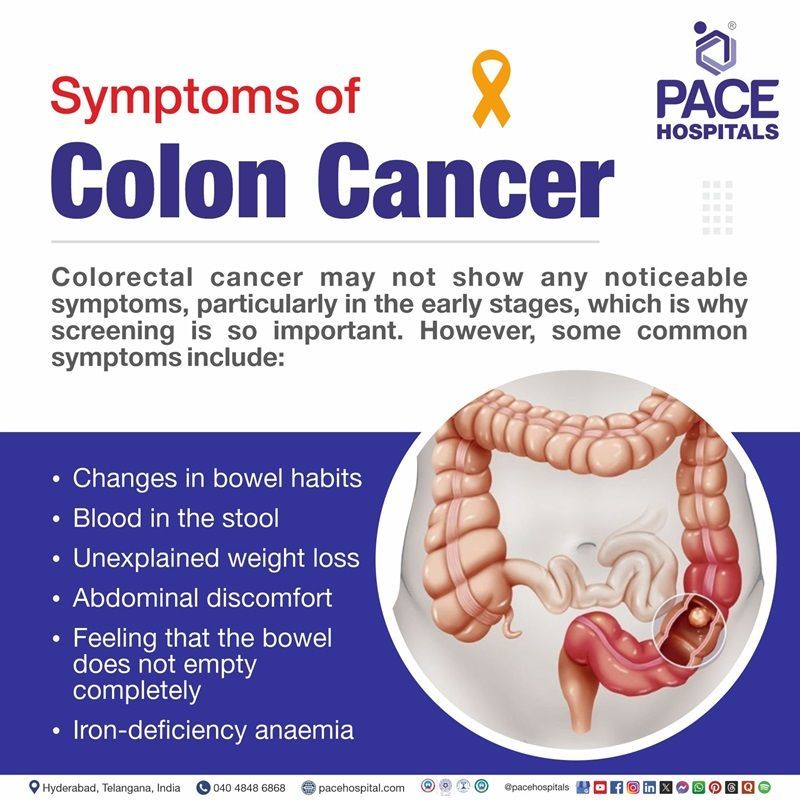
Colon cancer symptoms
Colon or colorectal cancer may not show any noticeable symptoms, particularly in the early stages, which is why screening is so important. However, some common colorectal cancer symptoms include:
Symptoms of colon cancer in men
- Changes in bowel habits: This may include diarrhoea, constipation, or a change in stool consistency that lasts more than a few days.
- Blood in the stool: Either bright red or dark, tarry stools can indicate bleeding in the colon or rectum.
- Unexplained weight loss: Significant weight loss without a known cause.
- Abdominal discomfort: Cramping, bloating, or pain in the abdomen, which may be persistent.
- Fatigue: Extreme tiredness or weakness that doesn't improve with rest.
- Feeling that the bowel does not empty completely: A sensation of incomplete evacuation.
- Iron-deficiency anaemia: This can occur if the cancer causes slow internal bleeding, which decreases red blood cells.
Colon cancer recurrence symptoms may include abdominal pain, changes in bowel habits, unexplained weight loss, fatigue, and blood in the stool.
Symptoms of colon cancer in women
Colon cancer symptoms are similar in both men and women, including changes in bowel habits, blood in stool, and abdominal pain. However, women may experience more vague symptoms like fatigue or unexplained weight loss.
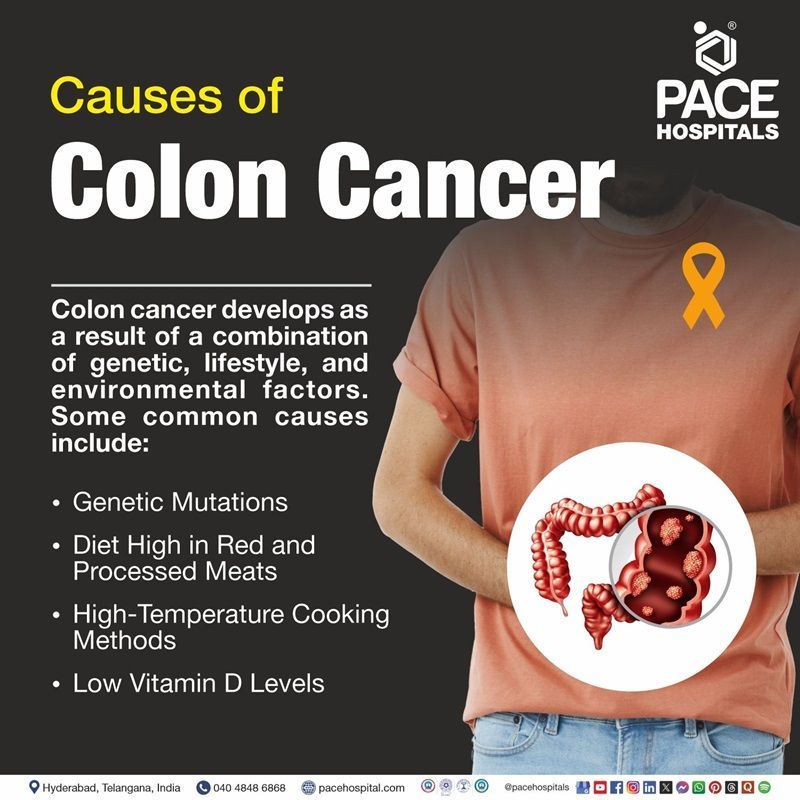
Colon cancer causes
Colon cancer develops as a result of a combination of genetic, lifestyle, and environmental factors. Some common colorectal cancer causes include:
- Genetic Mutations and DNA Changes: Colon cancer typically begins when healthy (normal) cells in the colon develop mutations in their DNA, which leads to uncontrolled cell growth. Genetic mutations like Lynch syndrome and familial adenomatous polyposis (FAP) also contribute.
- Diet High in Red and Processed Meats: A diet rich in red meats (pork, beef, liver or lamb) and processed meats increases the risk of colorectal cancer.
- High-Temperature Cooking Methods: Cooking meats at very high temperatures (such as frying, broiling, or grilling) can create chemicals that may raise the risk of developing colon cancer.
- Low Vitamin D Levels:
Vitamin D deficiency has been associated with an increased risk of colorectal cancer.
Colon cancer risk factors
Understanding colorectal cancer risk factors helps identify high-risk persons who may benefit from early screening and preventive measures. The following are some of the key factors which play a major role in increasing the chances of developing colon cancer by influencing the body's biology and the likelihood of genetic mutations.
- Age: Colorectal cancer risk increases as a person ages. It is increasing among individuals younger than 50, and the exact reason remains unclear. Younger adults can also get it, but it is more common after age 50.
- Gender: Men who have colorectal cancer are more likely to die from it than women. The exact reasons are not fully clear. It is also possible for women to develop this disease after they reach menopause. Women with colorectal cancer are more likely to have right-sided colon cancer, especially if they are postmenopausal.
- Family History: A family history of colon cancer or polyps increases the risk. People who have a first-degree relative, such as a parent, sibling, or child, with a colorectal cancer history are at an increased risk of developing the disease themselves. This risk is even greater if the relative was diagnosed before age 50 or if more than one first-degree relative has been diagnosed.
- Physical Inactivity: Lack of exercise or a sedentary lifestyle can lead to weight gain and increased inflammation, both of which are linked to a higher risk of colon cancer by promoting abnormal cell growth in the colon.
- Cholecystectomy: Patients who have had their gallbladder removed may have a slightly elevated risk of right-sided colon cancer, although the reasons for this link are not yet fully understood.
- Diet: Processed meats, diets high in red meats and low in fibre can raise the risk of colon cancer.
- Obesity: Obesity can increase the risk of colon cancer by causing chronic inflammation and altering hormone levels, promoting the growth of cancer cells in the colon.
- Past history of particular conditions:
- Inflammatory bowel disease (IBD): If the patient has an IBD condition, including either Crohn's disease or ulcerative colitis, the colorectal cancer risk is increased.
- Having a history of adenomatous polyps (adenomas) can raise the risk of developing colorectal cancer, especially if the polyps are large, if any of them show dysplasia, or if there are multiple numbers of polyps.
- The study indicated that people with diabetes have a 47% greater risk of developing colorectal cancer compared with people without diabetes.
- A past history of radiation to the pelvis area or abdomen: If the person has received radiation to the abdomen or pelvis area, particularly as a child, that person may need to start getting screened for colorectal cancer when the person is younger and be screened more often.
- Smoking and Alcohol Use: Excessive alcohol consumption and cigarette smoking are linked to a higher risk of colon cancer.
Complications of colon cancer
Complications of colon cancer significantly affect the patient's quality of life and can depress the prognosis by causing additional health issues. Below mentioned are some of the complications associated with colon cancer:
- Metastasis (Cancer Spread): Colon cancer can spread to other organs, especially the liver and lungs, causing additional health problems.
- Bowel obstruction: A tumor can block the colon, leading to bowel obstruction, which causes severe abdominal pain, nausea, and vomiting.
- Perforation: In some cases, the tumor can cause the colon to rupture, leading to peritonitis, a severe abdominal infection.
- Bleeding: Colon cancer may cause internal bleeding, leading to anaemia or the need for blood transfusions.
- Emotional and Psychological Impact: The diagnosis and treatment of colon cancer can lead to mental health challenges, including anxiety and depression.
Identifying and understanding these complications help to guide appropriate treatment and management, improving outcomes and alleviating suffering.
Colon cancer diagnosis
Many healthcare professionals recommend adults start colon cancer screening at age 45. To diagnose colon cancer, the healthcare team uses a combination of certain tests, including:
- Medical history and physical exam
- Imaging Tests
- CT scan
- MRI
- X-rays
- Blood Tests
- Complete blood count (CBC),
- Liver function tests (LFTs) and tumor markers (e.g., CEA)
- Biopsy
- Stool tests
- Guaiac faecal occult blood test (gFOBT)
- Faecal immunochemical test (FIT or iFOBT)
- Multitarget stool DNA testing (sDNA-FIT)
- Direct visualization tests
- Colonoscopy
- Virtual colonoscopy
- Sigmoidoscopy
- Other methods
- Double-contrast barium enema (DCBE)
- Single-specimen gFOBT performed in a doctor's office
Colon cancer treatment
Colorectal cancer treatment options depend on the tumor location, stage of the cancer and the overall health of the patient. Common treatment options include:
- Surgery
- Colectomy
- Chemotherapy
- Radiation Therapy
- Targeted Therapy
- Immunotherapy
- Palliative Care
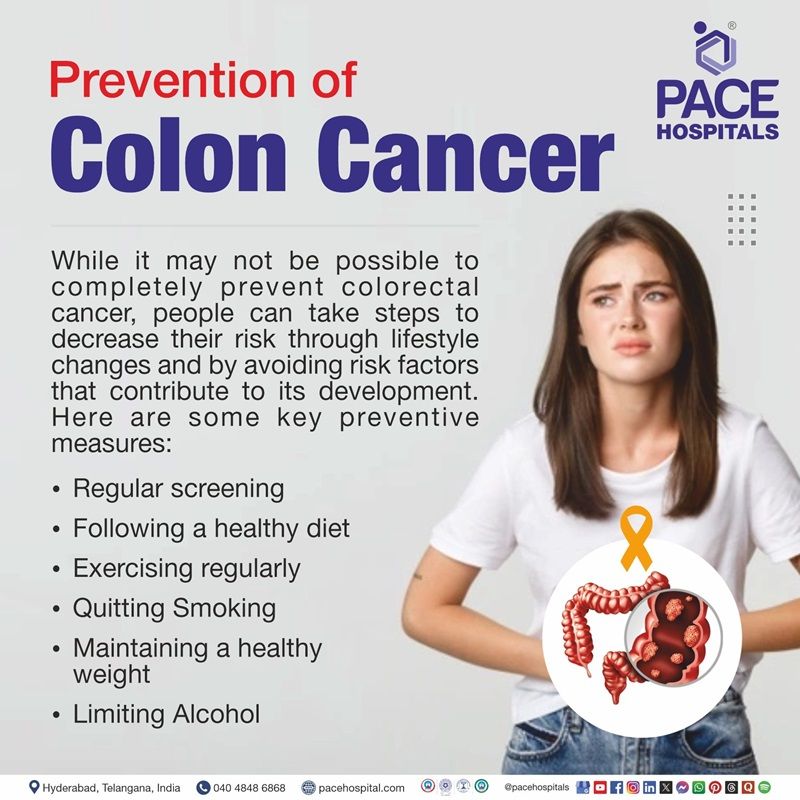
Colon Cancer Prevention
While it may not be possible to completely prevent colorectal cancer, people can take steps to decrease their risk through lifestyle changes and by avoiding risk factors that contribute to its development. Here are some key preventive measures:
- Regular screening: Regular screenings such as colonoscopies allow for early detection of colon cancer in individuals over 50 or with other risk factors, leading to better outcomes in their treatment.
- Following a healthy diet: A diet abundant in fruits, vegetables, and fibre limits processed foods, red meats, and alcohol, which have a potential role in reducing colon cancer risk.
- Exercising regularly: Being physically active regularly reduces the risks of colon cancer.
- Quitting Smoking: Staying away from tobacco smoke is one of the best preventive measures against cancer.
- Maintaining a healthy weight: Being overweight or obese raises risk, so staying at a normal weight can reduce the likelihood of cancer.
- Limiting Alcohol: Limiting alcohol consumption is an essential factor for preventing colon cancer.
Difference between IBS and Colon cancer
IBS vs Colon cancer
Though both IBS and colon cancer affect the gastrointestinal tract, the most significant difference lies in their underlying causes, clinical behaviour, and severity. Below is a comparison of these two conditions:
| Elements | Irritable bowel syndrome | Colon cancer |
|---|---|---|
| What it is | A functional disorder affecting the large intestine. | It is a malignant tumour (cancerous tumour) that originates in the colon, part of colorectal cancer. |
| Causes | Not clear, but stress, diet, and gut motility abnormalities may contribute. | Genetic mutations, environmental factors, and lifestyle factors (e.g., diet, smoking). |
| Onset | Typically begins in young adulthood (20-30s). | More common in individuals over 50, though it can occur at any age. |
| Nature | Non-malignant, functional condition. | Malignant (cancerous), with potential to spread (metastasize). |
| Symptoms | Abdominal pain, bloating, diarrhoea, constipation, or both. | Persistent abdominal pain, blood in stool, weight loss, fatigue, and changes in bowel habits. |
| Treatment | Lifestyle changes, dietary modifications, medications (antispasmodics, laxatives, anti-diarrheals). | Surgery, chemotherapy, radiation therapy, targeted therapy. |
Frequently Asked Questions (FAQs) on Colon cancer
Is colon cancer curable?
Colon cancer is treatable, particularly when detected early, and is often curable when localized to the bowel. Treatment options include surgery (such as colectomy) to remove the tumour, along with chemotherapy and radiation therapy, can effectively treat early-stage colon cancer. However, certain advanced cases may require more extensive treatment focused on symptom management and life extension.
What are the leading causes of colon cancer?
The main causes of colon cancer include genetic mutations, age, diet (high in red meat and low in fibre), lack of physical activity, smoking, heavy alcohol consumption, and inflammatory bowel diseases like Crohn's disease or ulcerative colitis.
Is colon cancer hereditary?
While most cases of colon cancer are not inherited, having a family history of colon cancer can increase the risk. Genetic conditions like Lynch syndrome and familial adenomatous polyposis (FAP) also raise the risk.
What are the early symptoms of colon cancer?
Common early signs of colon cancer include changes in bowel habits, blood in the stool, unexplained weight loss, abdominal pain or cramping, and fatigue.
Can colon cancer recur after treatment?
Yes, colon cancer can recur after treatment, especially if it is diagnosed at an advanced stage. Regular follow-up care and screenings are essential to monitor for recurrence.
Can colon cancer be treated?
Yes, colon cancer can be treated with surgery, radiation therapy, chemotherapy, and targeted therapies, depending on the stage and location of the tumour.
Can colon cancer occur in non-smokers?
Yes, colon cancer can occur in non-smokers. Factors like family history, poor diet, and certain genetic conditions contribute to the development of colon cancer, even in individuals who do not smoke.
How to survive stage 4 colon cancer?
Stage 4 colon cancer is difficult to cure, but treatment options like chemotherapy, targeted therapy, immunotherapy, and palliative care can help extend life expectancy and improve quality of life. Close monitoring and a comprehensive care plan are essential.
Who treats colon cancer?
Colon cancer is treated by a multidisciplinary team of specialists, including
oncologists, colorectal surgeons, radiation oncologists, and
gastroenterologists, depending on the patient's needs.
Is colon cancer dangerous?
Yes, colon cancer can be very dangerous if not detected early. It can spread to other organs and become more challenging to treat, which increases the risk of serious health complications.
No, constipation itself doesn't cause colon cancer. However, chronic constipation could potentially be a symptom of underlying issues, so it's important to address long-term digestive problems.
Is colorectal cancer aggressive?
Colorectal cancer can be aggressive, especially in advanced stages, when it spreads to other organs. Early detection and treatment improve outcomes significantly.
Can a stool sample detect colon cancer?
Yes, stool samples can detect signs of colon cancer, such as blood or abnormal DNA, through tests like the FIT (Faecal Immunochemical Test) or Cologuard.
What is metastatic colorectal cancer?
Metastatic colorectal cancer occurs when cancer cells from the colon or rectum spread to various parts of the body, like the liver, lungs, or lymph nodes, making it more challenging for physicians to treat.
Can colorectal cancer be cured without surgery?
While surgery (removal of cancerous tumor) is one of the most effective treatments, some cases of early-stage colorectal cancer might be treated with radiation or chemotherapy alone, but surgery generally remains crucial for a complete cure.
How much time does colon cancer take to spread?
Colon cancer can take several years to spread, often starting as a small polyp that slowly grows and eventually invades nearby tissues. The exact timeline varies based on the individual's health, the cancer type, and how aggressive it is, but it typically takes about 5 to 10 years for a polyp to develop into invasive cancer. Early detection is key to preventing metastasis.
Request an appointment
Fill in the appointment form or call us instantly to book a confirmed appointment with our super specialist at 04048486868
Appointment request - health articles
Thank you for contacting us. We will get back to you as soon as possible. Kindly save these contact details in your contacts to receive calls and messages:-
Appointment Desk: 04048486868
Whatsapp: 8977889778
Regards,
Pace Hospitals
Hitech City and Madinaguda
Hyderabad, Telangana, India.
Oops, there was an error sending your message. Please try again later. We will get back to you as soon as possible. Kindly save these contact details in your contacts to receive calls and messages:-
Appointment Desk: 04048486868
Whatsapp: 8977889778
Regards,
Pace Hospitals
Hitech City and Madinaguda
Hyderabad, Telangana, India.
Our Locations – Find the Best Hospital Near You
Metro Pillar Number C1772, Beside Avasa Hotel, Hitech City Road, Near HITEC City Metro Station, Hyderabad, Telangana, India.
Mythri Nagar, Beside South India Shopping Mall, Hafeezpet, Madeenaguda, Hyderabad, Telangana, India.
040 4848 6868
Payment in advance for treatment at PACE Hospitals, Hyderabad, Telangana, India (Pay in INR ₹)
For Bank Transfer:-
- Bank Name: HDFC
Company Name: Pace Hospitals
A/c No.50200028705218
IFSC Code: HDFC0000545 - Bank Name: STATE BANK OF INDIA
Company Name: Pace Hospitals
A/c No.62206858997
IFSC Code: SBIN0020299
Scan QR Code by Any Payment App (GPay, Paytm, Phonepe, BHIM, Bank Apps, Amazon, Airtel, Truecaller, Idea, Whatsapp etc).

CONTACT US
Call: +914048486868
WhatsApp: +918977889778
Email: info@pacehospitals.in
FOLLOW US
SUBSCRIBE
Subscribe to our newsletter and stay updated with the latest health information.
Subscribe to PACE Hospitals' Public Newsletter
Thank you for subscribing to PACE Hospitals' Newsletter. Stay updated with the latest health information.
Oops, there was an error. Please try again submitting your details.
ABOUT US
QUICK LINKS
Disclaimer
General information on healthcare issues is made available by PACE Hospitals through this website (www.pacehospital.com), as well as its other websites and branded social media pages. The text, videos, illustrations, photographs, quoted information, and other materials found on these websites (here by collectively referred to as "Content") are offered for informational purposes only and is neither exhaustive nor complete. Prior to forming a decision in regard to your health, consult your doctor or any another healthcare professional. PACE Hospitals does not have an obligation to update or modify the "Content" or to explain or resolve any inconsistencies therein.
The "Content" from the website of PACE Hospitals or from its branded social media pages might include any adult explicit "Content" which is deemed exclusively medical or health-related and not otherwise. Publishing material or making references to specific sources, such as to any particular therapies, goods, drugs, practises, doctors, nurses, other healthcare professionals, diagnoses or procedures is done purely for informational purposes and does not reflect any endorsement by PACE Hospitals – your trusted hospital near me.

